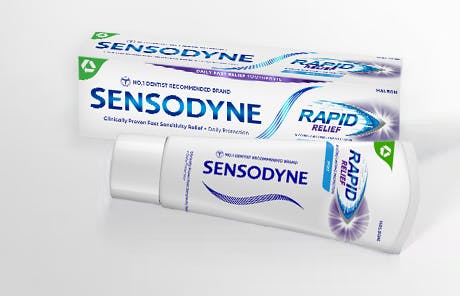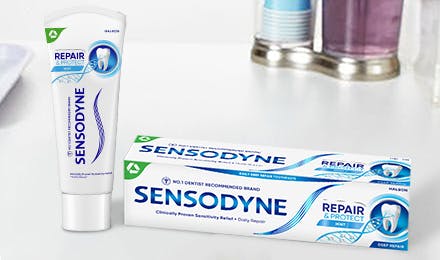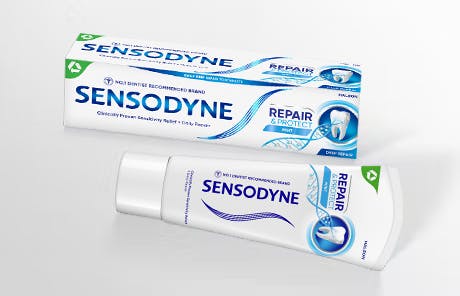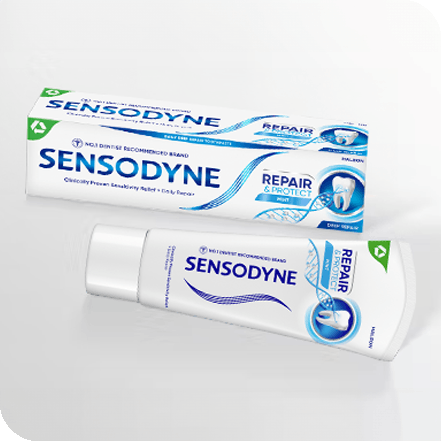
Tooth Decay and Infection: Causes, Symptoms and Relief
CAUSES OF TOOTH DECAY AND INFECTION
You’ve no doubt heard of dental plaque, the translucent, sticky film of bacteria that coats our teeth. It’s a normal part of our everyday oral health experience, but did you know that plaque build-up can contribute to the development of tooth decay and tooth infections?1
DECAY
When we consume food and drinks that are high in carbohydrates, particularly sugary ones like soft drinks or sweets, the bacteria in plaque turns those carbohydrates into energy they need. However, this process also produces acid at the same time, which can be harmful to our teeth and cause decay.
This acid can break down the surface of the tooth (known as the ‘enamel’) and cause small holes (cavities) to appear.1,2
It’s important to note that tooth decay is different from tooth erosion, although both conditions can lead to painful oral health issues. Learn more about the difference between decay and erosion.
INFECTION
So, how can plaque lead to a tooth infection?
Once decay has caused cavities in your teeth, it makes way for plaque and bacteria to reach the dentine, the softer bone-like material underneath our tooth enamel. If not treated at this stage, bacteria can then also enter the pulp, the soft centre of the tooth that contains nerves and blood vessels.1
Not only can this cause a painful toothache, but your nerves’ exposure to bacteria can also cause a dental abscess (a collection of pus that can form inside the teeth or gums) to develop in the pulp. At this point, a bacterial infection has been developed, which can also spread into the bone that holds your teeth in place.1,3
Other factors that may increase your chances of developing a dental abscess as a result of a tooth infection include:3
- Poor oral hygiene – plaque can build up on your teeth if you do not brush and floss your teeth daily.
- Injury or previous surgery to your teeth or gums – bacteria can get into any damaged parts of the teeth or gums.
- A weakened immune system – this includes people with certain underlying health conditions, such as diabetes, and those having treatment, including steroid medication or chemotherapy.
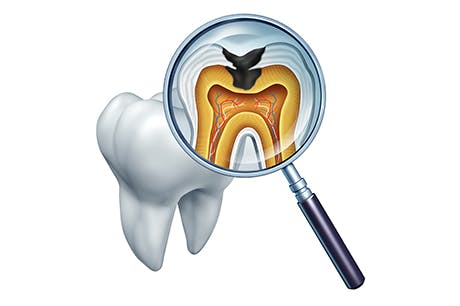
SIGNS AND SYMPTOMS OF TOOTH DECAY OR INFECTION
DECAY
Tooth decay is not always painful, so it’s important to be on the lookout for other symptoms, too. Common signs of tooth decay include:1
- toothache (either continuous pain keeping you awake, or occasional sharp pain without an obvious cause)
- tooth sensitivity (tenderness or pain when eating or drinking something hot, cold or sweet)
- grey, brown or black spots appearing on your teeth
- bad breath
- an unpleasant taste in your mouth
INFECTION
The most common sign of a tooth infection is the formation of a dental abscess. Like tooth decay, abscesses are often painful, but not in all cases. You may have a dental abscess if you are also experiencing:3
- an intense throbbing pain in the affected tooth or gum that may come on suddenly and gets gradually worse
- pain that spreads to your ear, jaw and neck on the same side as the affected tooth or gum
- pain that's worse when lying down, which may disturb your sleep
- redness and swelling in your face
- a tender, discoloured or loose tooth
- shiny, red and swollen gums
- tooth sensitivity to hot or cold food and drink
- bad breath or an unpleasant taste in your mouth
If your tooth infection spreads, you may also develop a high temperature (fever) and feel generally unwell.3
In the event that you develop a wisdom tooth infection (also known as pericoronitis), you may experience slightly different symptoms, including:4
- painful, swollen gum tissue near the affected wisdom tooth
- difficulty biting down in that area without hitting swollen gum tissue
- an unpleasant smell or taste in your mouth
- a discharge of pus near the affected wisdom tooth
You’re more likely to develop a wisdom tooth infection in your lower wisdom teeth.4
In severe cases where a wisdom tooth infection has spread to your throat or neck, you may experience swelling in the side of your face that the infected tooth is on, swollen lymph nodes and jaw spasms. Contact your dentist immediately if you develop these symptoms.4
HOW TO TREAT TOOTH DECAY AND TOOTH INFECTIONS
If you think you may have developed tooth decay or a tooth infection, speak to your dentist as soon as possible so that you can get the appropriate treatment.
Tooth decay is much easier and cheaper to treat in its early stages, so the sooner you receive treatment, the better.1 In the case of tooth infections, professional treatment is essential as dental abscesses do not go away on their own. In some cases, they can even spread to other parts of the body and cause illness.3
Learn more about treatment options for tooth decay and tooth infections on our page about tooth pain.
Sources: Clicking any of the links below takes you to an external website that is independently operated and not managed by GSK. GSK assumes no responsibility for the content on the website. If you do not wish to leave this website, do not click on the links below.
- Tooth decay. NHS. https://www.nhs.uk/conditions/tooth-decay/. Accessed 13/08/20.
- Tooth decay. MedlinePlus. https://medlineplus.gov/toothdecay.html. Accessed 13/08/20.
- Dental abscess. NHS. https://www.nhs.uk/conditions/dental-abscess/. Accessed 13/08/20.
- Periocoronitis. Columbia University College of Dental Medicine. https://www.dental.columbia.edu/patient-care/dental-library/pericoronitis. Accessed 17/08/20.


